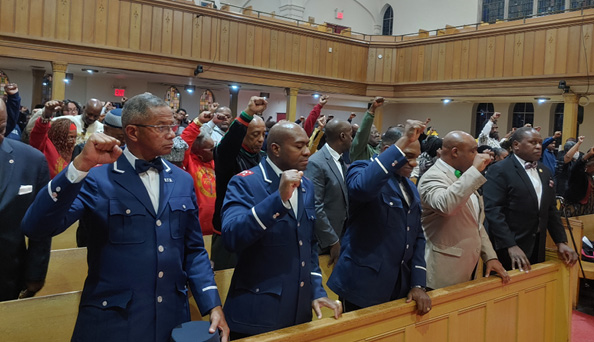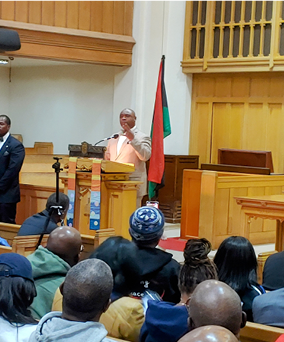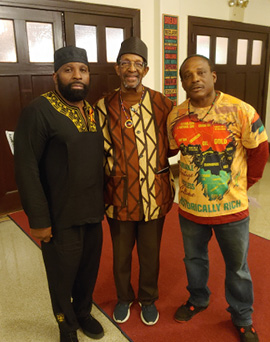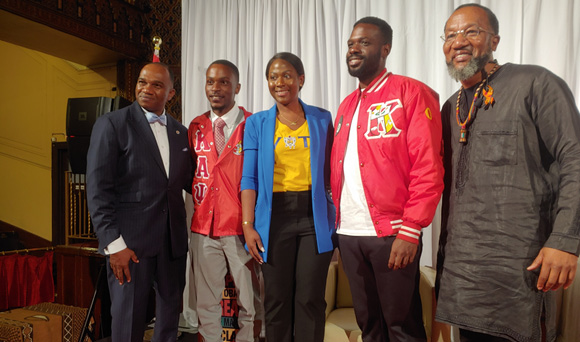By Daleel Jabir Muhammad
NEW YORK—A bold and beautiful celebration of Black unity in honor of Dr. Carlos Russell, the founder of Black Solidarity Day, brought together a diverse panel of leaders in politics, clergy, and students on Nov. 2 at Friendship Baptist Church in Brooklyn. Dr. Russell was a historian, scholar, revolutionary freedom fighter and Pan-Africanist who called for the first Black Solidarity Day 55 years ago on November 3, 1969. His call for unity on a day of absence from work, school and shopping was to show the world how much power Black people had if they united on a day of protest before Election Day.

On the heels of the end of the Civil Rights Movement, Dr. Russell called on other activists, politicians, teachers, students, unions, churches, and organizations to ban together collectively and to boycott to demonstrate against the discrimination, social injustice, job and housing inequities and other repressions that affected Black and Original peoples’ lives.
On Nov. 2, panelists were welcomed to Friendship Baptist Church by Pastor Rev. Craig Gaddy. They discussed the importance of Black Solidarity Day and why it’s important to unify today like Dr. Russell intended.
Dr. Ronald Daniels, president of the Institute of the Black World 21st Century and convenor of the National African-American Reparations Commission, called Dr. Russell a “fearless, compassionate, a professor and a pan-Africanist who came from the Caribbean, to reinvigorate our unity irrespective to wherever we came from.”
“Now it looks like the conditions are now producing new levels of conversations to bringing back the solidarity he hoped for to cultivate our culture across the diaspora,” he added.
Dr. Daniels pointed out that the way we build the base of the fractured Black community is to start where we are, on the blocks and precincts that we live on, fashioned in the same way the Nation of Islam did and pointed out that method is still successful because, “the Nation didn’t wait for people to come to them, they went to where the people were to offer them tangible solutions to improve their lives.”
Sister Colette Pean from the December 12th Movement stated, “We must engage different groups in our community to share this work and to keep rallying people to the streets by staying connected.” In line with connecting issues in housing, jobs and hunger, Ivy Gamble Cobb explained that, “we must put our egos aside and focus on our own issues to empower Black people.”

Regarding the role of education and teaching Black children, Student Minister Henry Muhammad, of Mosque No. 7C in Brooklyn, pointed out that, “knowledge is power and with knowledge we must build our businesses, our institutions and our own schools.” He added, “The Most Honorable Elijah Muhammad was the first to establish an independent school system that prepares our children to become leaders and to develop their full potential in the Muhammad University of Islam schools around the country. The Honorable Minister Louis Farrakhan following the example of his teacher, the Most Honorable Elijah Muhammad, is developing the minds of our children to empower them and to empower our people with that knowledge.”
Dr. David Allen of African Methodist Episcopal Church explained the importance of Black people relearning Black history. He stated that “it’s critical that we stop working in silos and be willing to change our standards.”
The panelists agreed to partner with each other, students, and other youth to build common ground solidarity for the benefit of Black and Original people. Dr. Ron Daniels touched on the passion of Dr. Russell as he remembered him and added, “we must be advocates for our own race no matter where we are. Like Marcus Garvey said, we must be race men and race women in a common cause.”
On Nov. 3, the pre-Black Solidarity weekend continued, and a host of speakers took to the historic rostrum at Bethany Baptist Church in Bedford Stuyvesant to remember Dr. Russell and what his agenda could have been if he were alive today to witness the conditions of Black people.

Student Minister Arthur Muhammad, of Mosque No. 7 said he was inspired by the “awesome display of Black Solidarity in Brooklyn” at the Nov. 3 program. “I recently learned about the Honorable Minister Louis Farrakhan’s involvement in helping to mobilize the masses and to get the day off the ground in 1969. In an interview that I watched of an unsung hero and revolutionary leader, Dr. Carlos Russell, the founder of Black Solidarity Day, (he) stated that when Minister Louis Farrakhan decided to support the day, it took off exponentially in the Black community. We must get back to fighting together against the forces that oppress us rather than fighting each other over little to nothing,” said Student Min. Arthur Muhammad.
Longtime community servants Charles and Inez Barron stressed the need for building core values based on African culture and not Westernized culture and stressed the need for peace and unity necessary in building power. “Power is the great equalizer, when you have power, racism becomes irrelevant,” Mr. Barron strongly asserted.
Dr. Segun Shabaka stressed the need for Black institutions, schools, businesses, and organizations to unify without uniformity. Raymond Dugue of the U.N.I.A. emphatically stated, “We must agitate, educate, and organize! That is our task here at this Black Solidarity Day meeting, to build Black power by creating an alliance of grassroots organizations,” he said, adding, “we must set an agenda to unite on a mass basis to address our issues.”
Intermission included the Victory Music and Dance Youth Ensemble from the Brownsville section of Brooklyn led by Nicole Williams, its founder and CEO. The ensemble dedicated their dance routine to the late Alvin Ailey.
A moment of silence was momentarily observed as right-handed fists were raised in remembrance of the late and beloved mother of the modern-day revolutionary movement, Sister Queen Mother Viola Plummer, a founder of the December 12th Movement, a longtime activist, a comrade and friend of Dr. Carlos Russell and the Honorable Minister Louis Farrakhan. Ms. Plummer passed away earlier this year.
—Daleel Jabir Muhammad
.













